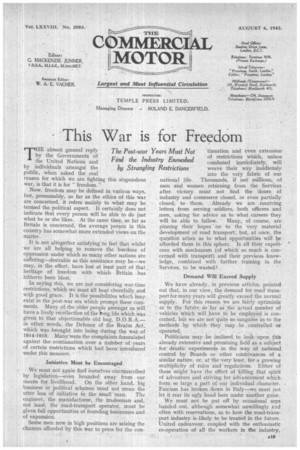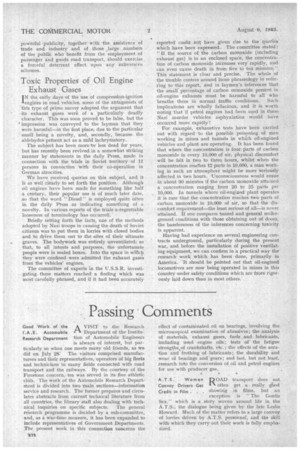This War is for Freedom
Page 15

Page 16

If you've noticed an error in this article please click here to report it so we can fix it.
THE almost general reply by the Governments of the United Nations and by individuals amongst the public, when asked the real reason for which we are fighting this stupendous war, is that it is for "freedom."
Now, freedom may be defined in various ways, but, presumably, so far as the ethics of this war are concerned, it refers mainly to what may be termed the political aspect. It certainly does not indicate that every person will be able to do just what he or she likes. At the same time, so far as Britain is concerned, the average person in this country has somewhat more extended views on thern matter.
It is not altogether satisfying to feel that whilst we are all helping to remove the burdens of oppression under which so many other nations are suffering—desirable as this assistance may be—we may, in the effort, have lost at least part of that heritage of freedom with which Britain has hitherto been blest.
In saying this, we are not considering war-time restrictions, which we must all bear cheerfully and with good grace. It is the possibilities which 'may exist in the post-war era which prompt these comments. Many of the older people amongst us will have a lively recollection of the tong life which was given to that objectionable old hag, D.O.R.A.— in other words, the Defence of the Realm Act, which was brought into being during the war of 1914-1918. Many were the complaints formulated against the continuation over a nurnber of years of certain restrictions which ,had been introduced under his measure.
Initiative Must be Encouraged We must not again find ourselves circumscribed by legislation—even hounded away from our means for livelihood. On the other hand, big business or 'political schemes must not mean the utter loss of initiative to the small man. The engineer, the manufacturer, the tradesman and, not least, the road-transport operator, must be given full opportunities of founding businesses and of expansion.
Some men now in high positions are seizing the chances afforded by this war to press for the con tinuation and even extension of restrictions which, unless combated imMediately, will weave their way insidiously into the very fabric of our national life. Thousands, if not millions, of men and women returning from the Services after victory must not find the 'doors of , industry and commerce closed, or even partially closed, to them. Already we are receiving letters, from serving soldiers, both officers and men, asking for advice as to what careers they will be able to follow. Many, of course, are pinning their hopes -on—to the very material development of road transport; but, at once, the question arises as to what opportunities will l;;te afforded them in this sphere. Is all their experience with mechanism (of which so much is concerned with transport) and their previous knowledge, combined with further training in the Services, to be wasted?
Demand Will Exceed Supply We have already, in previous articles, pointed out that, in our view, the demand for road transport for many years will greatly exceed the normal supply. For this reason we are fairly optimistic as to the future so far asthe actual number of vehicles which will have to be employed is concerned, but we are not quite so sanguine as to the methods by which they may be controlled or operated. , Politicians may be inclined to look upon this already extensive and promising field as a subject for drastic experiments in the way of national control by Boards or other contrivances of a similar nature, or, at the very least, for a growing multiplicity of rules and regulations. Either of these might have the 'effect of killing that spirit of adventure and striving for advancement which form so large a part of our individual character. Fascism has broken down in Italy—we must not let it rear its ugly head here under another guise.
We must not be put off by occasional sops handed out, although somewhat unwillingly and often with reservations, as to how the road-trans, port industry is likely, to be treated in the future. United endeavour, coupled with the enthusiastic co-operation of all the workers in the industry, powerful publicity, together with the assistance of trade and industry and of those ..,large numbers of tile public who benefit from the employment of passenger and goods road transport, should exercise a forceful deterrent effect upon any subversive schemes.
Toxic Properties of Oil Engine Exhaust Gases
IN the. early days of the use of compression-ignition engines in road vehicles, some of the antagonists of this type of prime mover adopted the argument that its exhaust gases were of a -particularly deadly character. This was soon proved to be fale, but the impression was conveyed to the layman that they were harmful—in the first place, due to the particular ' smell being a novelty, and, secondly, because the aldehydes present act as a mild lachrymatory.
The subject has been more 'or less dead for years, but has recently been revived in a somewhat striking manner by statements in the daily Press, made in connection with the trials in Soviet territory of 11 persons in connection with their co-operation in German atrocities.
We have received queries on this subject, and it is as well clearly to set forth the position. Although oil engines have been made for something like half a century, -their popular use is of much later date, ,so that the word "Diesel." is employed quite often in the daily Press as indicating something of a novelty. In various reports of the trials a-regrettable looseness of terminology has occurred.'
Briefly setting forth the facts, one of the methods adopted by Nazi troops in causing the death of Soviet citizens was to put them in lorries with closed bodies and to drive them out to the -sites of their ultimate graves. The bodywork was entirely unventilated; so that, to all intents and purposes, the unfortunate people were in sealed boxes. Into the space in which they were confined, were admitted the exhaust gases from the vehicles' engines.
The committee of experts in the U.S.S.R. investigating. these matters reached a finding which was most carefully -phrased, and if it had been accurately
reported could not have given rise to the queries which have been expressed.. The committee stated: "If the source of the carbon manoxide (including exhaust gas) is in an • enclosed space, the concentration of carbon monoxide increases very rapidly, and can even cause death in from five to ten minutes.", This -statement is clear and precise. The whole of the trouble centres around loose phraseology in referring to this report, and in laymen's inferences that the small' percentage of carbon monoxide present in oil-engine exhausts must be harmful to all %%rho breathe them in normal traffic conditions, Such implications are wholly fallacious,, and it is worth noting that if petrol engines had been used in these Nazi' .murder vehicles asphyxiation would have occurred 'more rapidly !
For example, exhaustive tests have been carried out with regard to the possible poisoning of men working in Mines and tunnels in which oil-engined vehicles and plant are operating. It has been found that where the concentraticin is four Parts of carbon monoxide in every 10,000 of air, physical discomfort will be felt in two to three hours, whilst when the concentration reaches 12 parts in 10,000, a man working in such an atmosphere might be more Seriously affected in two hours. Unconsciousness would ensue in about 30 minutes if the carbon monoxide attained a concentration ranging from 20 to. 25 parts per 10,000. In tunnels where oil-engined plant operates it is rare that the concentration reaches two parts of carbon monoxide in 10,000 of air, so that the discomfort requirement—the least serious of all—is never attained. If one compares tunnel and general underground conditions with those obtaining out of doors, the haselessness of the inferences concerning toxicity is apparent.
Having had experience on several engineering contracts underground, particularly during the present war, and before the installation of positive ventilating equipment, we can confirm in a practical way the research work .which has been' done, primarily in America. It should be pointed out that oil-engined locomotives are now being operated in mines in this country under safety conditions which are More rigorously laid down than in most others.




















































